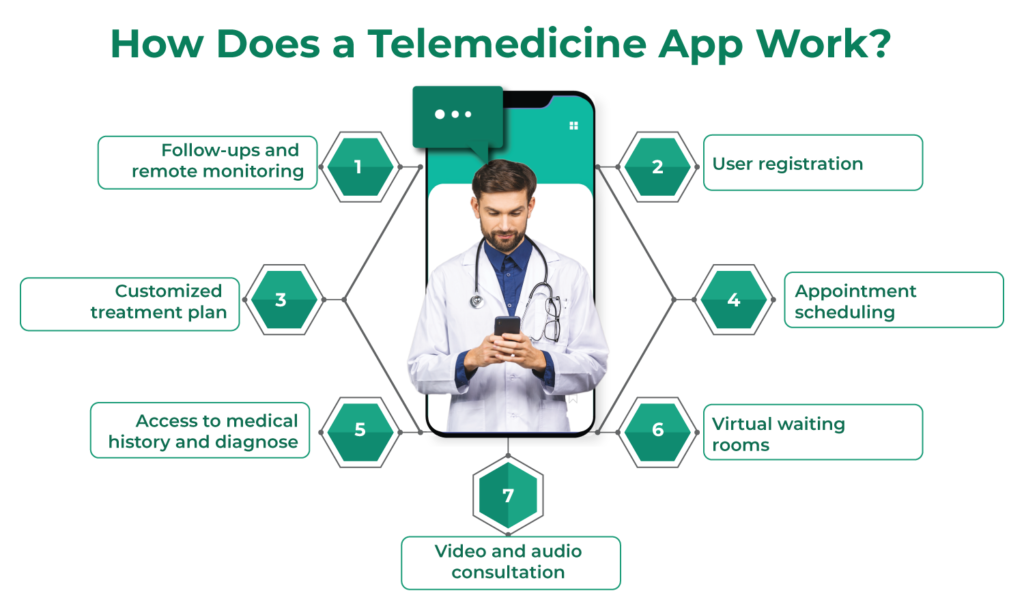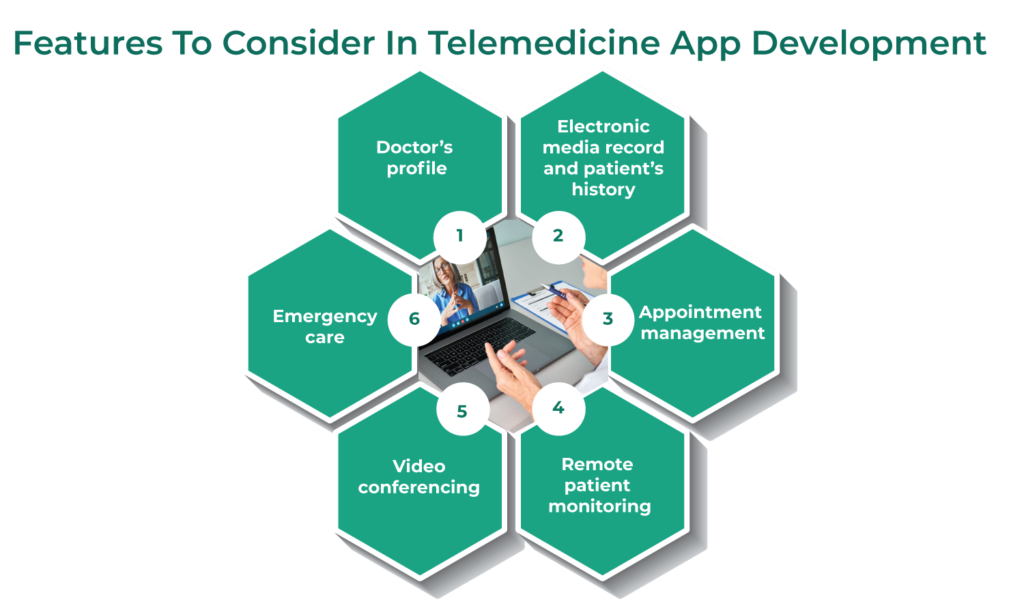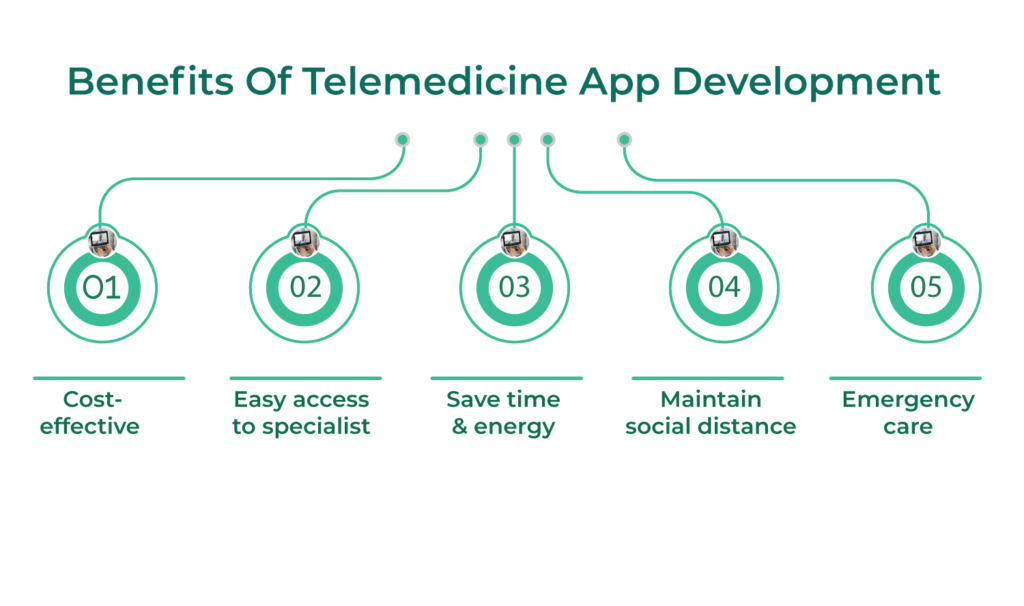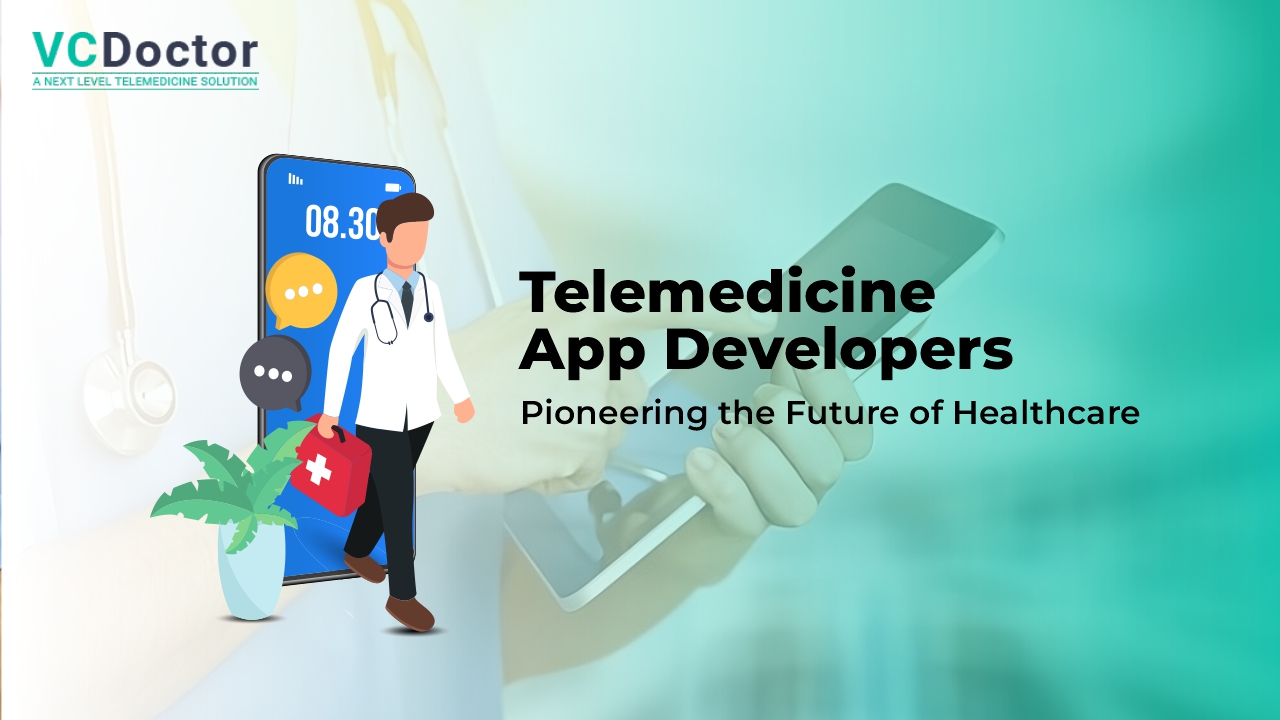Telemedicine App Developers – Pioneering the Future of Healthcare
During the COVID-19 pandemic, the world experienced a significant healthcare crisis. Thus, telemedicine app developers services revolutionized the healthcare industry with great accessibility and convenience. Since the global telemedicine market is increasing, this makes it a perfect time to develop telemedicine applications as they meet your remote healthcare needs and promise quality healthcare services from the comfort of your home.
With technological advances, telemedicine is making quality healthcare services accessible to all. As a result, it is regarded as the “future of healthcare.” So, if you plan to develop a telemedicine application, there are several top telemedicine app developers. This article is a complete guide on telemedicine app development, how it works, the future of telemedicine, and the best telemedicine app developer. So, without any delay, let’s dive in!
Table of Contents
- Introduction to Telemedicine Application
- How Does a Telemedicine App Work?
- Features To Consider In Telemedicine App Development
- Benefits Of Telemedicine App Development
- 1. Cost-effective
- 2. Easy access to specialist
- 3. Save time and energy
- 4. Maintain social distance
- 5. Emergency care
- Step-by-step Process Of Telemedicine App Development
- 1. Evaluate your idea
- 2. Compliance with regulations
- 3. User interface and user experience design
- 5. App development and testing
- 6. Telemedicine app deployment
- Role Of Telemedicine App Developer
- Cost Of Telemedicine App Development
- Telemedicine App Development Future
- Wrapping Up
- Frequently Asked Questions (FAQs)
- 1. What are the essential features of developing a telemedicine app?
- 2. Can AI be used in telemedicine?
- 3. What are some medical health concerns that can be addressed using telemedicine software?
- 4. What factors determine the cost of telemedicine app development?
- 5. List technologies used in telemedicine app development
Introduction to Telemedicine Application
Telemedicine in the healthcare industry uses telecommunication technology to evaluate a patient’s health. The application tracks symptoms and diagnoses underlying conditions. Additionally, it includes providing high-quality medical services over the Internet using the telemedicine application. But on the telemedicine app, doctors and patients can list themselves, book an appointment, and receive consultations from the comfort of their homes. Thus, it is great for patients and doctors alike. Above all, the telemedicine application is cost-effective and saves you time.
How Does a Telemedicine App Work?

A complete process of how does telemedicine app work:
1. User registration
Initially, users, including doctors and patients, must register themselves on the application for starting telemedicine app. It also includes building your profile by adding all relevant information like name, address, contact details, email ID, and medical history. Doctors and specialists will also have to mention their educational background, experience, and certifications.
2. Appointment scheduling
Once the profile is created, patients can schedule their appointments with the preferred health expert on the telemedicine app. But certain applications support real-time scheduling, whereas some apps allow patients to confirm their bookings in advance.
3. Virtual waiting rooms
After fixing the appointment with the healthcare expert, it is recommended that patients arrive early on and wait in the virtual waiting rooms. Unlike the traditional clinics, there is no in-person contact in these waiting rooms; thus, the chances of spreading infection are negligible.
4. Video and audio consultation
The next step involves getting into the video and audio consultation on the telemedicine app. Here, both the doctor and the patient connect with one another through video and audio calls, share problems, and answer questions.
5. Access to medical history and diagnose
Your doctor will closely access your medical history and any underlying condition to understand the cause of symptoms. They will also ask about your lifestyle, symptoms, and more for an accurate diagnosis.
6. Customized treatment plan
After diagnosing you and detecting the main health concern, a customized treatment plan is formulated by the doctor. Also, they may recommend various tests, prescribe medicines, and ask for rest.
7. Follow-ups and remote monitoring
Your doctor may schedule regular follow-ups to analyze your health condition. Beside this, the primary aim is to check how well the treatment is working.
Features To Consider In Telemedicine App Development
Here are the top features of the telemedicine app development:

1. Doctor’s profile
A doctor’s profile is a separate page where educational details and experience about medical experts are recorded. Personal details like name, picture, sex, age, and years of experience are all listed here. In addition, significant details, including educational background, medical specialization, and more, are also provided. Since the doctor’s availability and working hours are displayed on their profile, patients can easily make bookings. By examining the doctor’s profile, you can identify if they are an ideal fit for you!
2. Electronic media record and patient’s history
In the healthcare industry, electronic medical records, or ERM, are the same as your client relationship management system, or CRM. ERM’s principal goal is to safely store patients’ health status, medical history, diagnostics, and visit data in one place. Unlike in traditional settings, Doctors no longer have to cope with the paperwork. In addition, the ERM feature in the telemedicine app addresses security issues such as illegal access to patients’ medical records.
3. Appointment management
Another major feature in your telemedicine app development is appointment management. Using this feature, patients can seamlessly make bookings. Doctors and other medical experts can also schedule patients for telemedicine tests, follow-up consultations, seasonal immunizations, routine checkups, and recurring appointments.
4. Remote patient monitoring
The remote patient monitoring (RPM) module is recommended for patients with severe illnesses or chronic conditions. Some major primary health conditions include High blood sugar, cholesterol issues, infections, cancer, and other conditions. But through remote patient monitoring, the doctor stays connected 24/7. Also, the application for telemedicine needs to be integrated with these devices by your telemedicine app developer so that doctors may access safe and uninterrupted data flow.
5. Video conferencing
Another must-have feature in the telemedicine application is video conferencing, in which patients and doctors can connect and discuss symptoms and underlying health conditions. Unlike basic video conferencing, telemedicine apps support advanced video conferencing, where users can access educational information, medical history, and analytics. The doctor can also set up the upcoming online meeting through video conferencing based on the recovery process.
6. Emergency care
Medical health emergencies are a part of life that can occur anywhere and anytime. In such conditions, you do not want to take an hour-long drive, whereas getting solutions immediately is the best way to go. Through Telemedicine software solutions, you can contact your health expert, who provides emergency care, ensuring all symptoms settle down. Once you feel well, you can visit your doctor in person.
Benefits Of Telemedicine App Development
Here are the top benefits of telemedicine app development:

1. Cost-effective
On the telemedicine app, both doctors and patients can save a lot of money and expenses. As patients, there is no traveling expense involved. Additionally, you do not have to take leaves between work, making it an inexpensive option compared to traditional medical services.
2. Easy access to specialist
One major benefit of telemedicine is it provides easy access to industry-best doctors and specialists globally. If you also live in a remote or rural area or cannot travel to the doctor’s clinic, patients can connect with doctors and get quality healthcare facilities on the telemedicine app.
3. Save time and energy
Another major benefit of telemedicine app development is it saves your time and energy, as there is no need to commute to a doctor’s clinic to access symptoms and get a personalized treatment plan. There are several telemedicine app development companies building excellent telemedicine apps.
4. Maintain social distance
During the covid-19, social distancing was one way to avoid contracting the infection. Like the coronavirus, other infections spread by contacting the infected person directly. Thus, patients and doctors can maintain social distance on the telemedicine app as medical needs are fulfilled from a distance.
5. Emergency care
Medical emergencies can occur at any time and anywhere. Getting the right medical treatment rapidly during an emergency is important. Thus, you can rely on the telemedicine application for emergency care. Additionally, on the app, you can connect with a health expert and discuss symptoms. They will recommend a personalized treatment plan.
Step-by-step Process Of Telemedicine App Development
1. Evaluate your idea
If you plan to build your telemedicine application, first, evaluate your idea closely. Also, determine your target audience and decide on your telemedicine app’s core features and functionalities. Some common features in a telemedicine app include:
- Video consultations
- Appointment scheduling
- Electronic health records (EHR) integration
- Secure messaging
- Prescription management.
2. Compliance with regulations
While building the telemedicine application, understanding the healthcare rules and regulations is important. The Telemedicine app developers must also implement strong safety and security measures to safeguard the patient’s sensitive information.
3. User interface and user experience design
The next step is implementing UI and UX design. Start by creating a prototype and wireframes to understand the app’s layout. Also, ensure your telemedicine app features a user-friendly interface and is highly intuitive for improved user experience.
5. App development and testing
Now comes the development stage, where expert Telemedicine app developers develop the telemedicine application. But the developer implements the user interactions and UI designs on the chosen platform. Additionally, third-party AI’s are created for features including EHR systems, security payment processing, and messaging. Once the application is completely built, it undergoes a rigorous testing process.
6. Telemedicine app deployment
In the last step, the telemedicine apps are published on particular app stores, including the Google Play Store and Apple App Store. Further round-the-clock maintenance and support are offered for continuous improvements.
Role Of Telemedicine App Developer
Top telemedicine app developers are professional experts who play a major role in telemedicine app development. These developers understand a client’s requirements and collaborate with healthcare professionals. Also, they build a telemedicine application that promotes excellent user experience. Once the application is built, it undergoes tough testing and quality assurance to ensure it meets the predetermined standards.
Cost Of Telemedicine App Development
The cost to develop a telemedicine app in India can vary significantly based on features, complexity, and development team rates. A basic telemedicine app may cost around $10,000 to $20,000, while a more comprehensive and feature-rich app could range from $30,000 to $50,000 or more. It’s essential to discuss specific requirements with development firms for accurate pricing.
Telemedicine App Development Future
The future of telemedicine app development is known to be bright in the upcoming years as this technology offers excellent advantages to doctors and patients. When talking about India, the Indian telemedicine market will increase by $5.15 billion in 2030. As per the reports, 75% of the rural population uses telemedicine applications for quality healthcare services.
Are You Looking for a White Label Telemedicine Software?
Wrapping Up
Telemedicine apps are the need of the hour; thus, companies are hunting for the top telemedicine app developers who offer excellent services. The right app development company lets you choose the best development tools, determine hardware, and provide the best developers to begin with app development. VCDoctor is a leading telemedicine app development company developing HIPAA-compliant telemedicine software, ensuring high-level security and preventing malware and data breaches. They have a team of experienced developers who work to bring your idea to life. Thus, if you’re looking for industry-best solutions, choose VCDoctor today!
Frequently Asked Questions (FAQs)
1. What are the essential features of developing a telemedicine app?
A telemedicine app should include essential features such as secure video conferencing, appointment scheduling, patient records access, prescription management, payment processing, and a user-friendly interface. Compliance with healthcare regulations, robust security, and integration with Electronic Health Records (EHR) systems are also critical for ensuring patient privacy and seamless healthcare delivery.
2. Can AI be used in telemedicine?
Yes, AI can be extensively used in telemedicine. AI-powered chatbots can assist with patient inquiries and appointment scheduling. Machine learning algorithms can aid in diagnosing medical conditions and predicting patient outcomes. AI can also analyze vast amounts of patient data for personalized treatment recommendations, enhancing the efficiency and accuracy of remote healthcare delivery while reducing the burden on healthcare professionals.
3. What are some medical health concerns that can be addressed using telemedicine software?
Telehealth app developers can address health concerns. These include:
- Care consultations
- Psychotherapy
- General health care
- Physical therapy
- Dermatology, and more.
4. What factors determine the cost of telemedicine app development?
Some factors that determine the cost of telemedicine app development are security and safety, health monitoring, type of application, efficient time management, and expertise and experience of the Telemedicine App Developers.
5. List technologies used in telemedicine app development
Most technologies used in telemedicine app development include:
- Artificial intelligence
- The Internet of Things (IoT)
- Cloud storage
- Blockchain
- Big data
- Deep learning
- Augmented reality & virtual reality
- Telecommunication
- Cybersecurity
- Integration cybersecurity.




